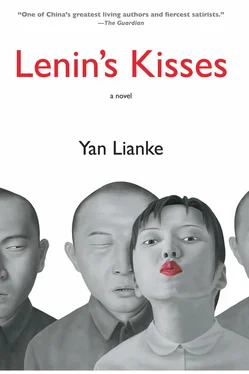Having endured this blizzard, summer did not have a trace of happiness on its full face 1when it returned. The sun refused to come out, and a heavy mist hovered over the village and the ridge — a mist so thick that it flowed through your fingers as if you were holding them under running water. In fact, the fog was so dense that if you got up in the morning and reached out your hands, they would get damp enough that you could then use them to wash the sleep right out of your eyes. The only problem is that your hands would be left slightly muddy from the dirty fog.
The snow melted.
The wheat that had not been harvested during the snowfall began to grow mold. Without sun, the air became stuffy and the wheat began to turn black. The wheat grain turned black, as did the wheat germ, and people who ate them would develop a bad case of the runs.
The wheat stalks in the fields mildewed, and the following winter the cattle didn’t have any hay to eat.
That autumn, there weren’t any wheat seeds to plant.
That’s when the county chief, the township chief, and the township chief’s secretary came to investigate the hardships the village had endured. The three of them were staying together in a courtyard inside 3the village. Before Liberation, this courtyard had been a Buddhist temple adorned with statues of bodhisattvas; Lord Guan, the god of war; and Lady Livening, the town’s sacred ancestor. It is said that the village owed its existence to the deaf-mute Lady Livening, in that it was precisely because she had prepared a nice meal for Hu Dahai — who had been humiliated while begging for alms in Shanxi’s Hongdong county — that Hu subsequently agreed to allow the blind Hongdong man and his crippled son to drop out of the migration procession and settle down here, even going so far as to provide them with silver, land, and water. They were therefore able to enjoy a heavenly existence, leading disabled people from throughout the land to flock over to join them. The result was the village of Liven.
All of this was thanks to that deaf-mute woman.
Eventually, however, the statues of the bodhisattvas disappeared, as did those of Lord Guan and of Lady Livening. The courtyard was swept clean, beds were built, and the three-room tile building was transformed into a guest house. Seventeen or eighteen years earlier, when Liu Yingque had been teaching at the soc-school, he had stayed in this very temple when he visited Liven, and now he was staying there again. The location was the same, but the people had changed. In the blink of an eye, the nearly forty-year-old county chief had reached middle age. As Liu looked back on his life — from his humble beginnings as a grounds-sweeper and water-boiler for the township’s soc-school; to being a teacher in Liven’s own school; to being appointed a township cadre; to being promoted to deputy township chief, township chief, and deputy county chief, and finally to his current position as county chief — he felt a distinct twinge of nostalgia.
Shuanghuai had long been dirt-poor. While much of the rest of the nation was enjoying an unprecedented wave of economic expansion, even the street directly in front of the Shuanghuai county government building remained unpaved. When it rained, the puddles in the street were deep enough to swallow an ox, and once a child fell into one and drowned. The county didn’t have any factories or mines, merely mountains and gorges, and until only a few years earlier, its county offices didn’t even have enough money to pay for electricity or phone service. At one point, representatives from the county committee and the county government got into a heated argument over who should be responsible for fixing a blown bicycle tire, whereupon the county chief at the time smashed the glass of pickled vegetables he was holding and the county committee secretary snapped in half a dust mop for cleaning the windows. The district Party committee secretary, Secretary Niu, had come over to try to work things out, and spoke to each of the county’s cadres in turn.
He first approached the county chief and demanded,
“What are you going to do to help this county get rich?”
The county chief replied, “That’s easy. I would need you to cut off my head.”
Secretary Niu then spoke to the county committee secretary, saying,
“If you can’t help the county shed its poverty, you shouldn’t be here.”
The county committee secretary bowed abjectly and replied,
“If you can transfer me somewhere else, I will kowtow to you right here and now.”
Secretary Niu replied,
“Then I’ll have you fired!”
The county committee secretary said,
“As long as you can get me out of here, I’d be happy to be fired.”
Furious, Secretary Niu smashed his teacup afoot. 5
He continued making the rounds to each of the other county cadres.
He told Deputy County Chief Liu, “Your fields look like they are nicely maintained.”
Deputy Chief Liu replied, “No matter how well we farm, we will still remain this poor.”
Secretary Niu asked, “Do you have any suggestions on how to help the county become rich?”
Deputy Chief Liu replied, “That’s easy.”
Secretary Niu stared at him intently, and said, “Then tell me.”
Deputy Chief Liu explained, “Given that we have neither factories nor mines, we must therefore use our scenery to manufacture pleasure.”
Secretary Niu asked, “What kind of pleasure can you manufacture with this kind of yellow earth and muddy water?”
Deputy Chief Liu replied, “Secretary Niu, does Beijing have many pleasure-loving residents?”
The secretary replied, “Beijing is the nation’s capital, and was the historic capital of many previous dynasties.”
The deputy chief responded with a question: “Do many people go visit the Chairman Mao Memorial Hall?”
The secretary said, “Sure, lots. So what?”
Deputy Chief Liu said, “We should allocate a large sum of money to fund a trip to Russia to purchase Lenin’s embalmed corpse and bring it back here. We could then display it at Shuanghuai’s Spirit Mountain.” He added, “Secretary Niu, have you been to Spirit Mountain? It is located two hundred li from here, and has a forest of cypresses and pine trees, with deer, monkeys, wild boars, and kiwi trees. It is a veritable forest park. If we were to display Lenin’s corpse there, the site would become peak 7 important, and people from around the country — and even the entire world — would come to appreciate it. If we were to charge five yuan per ticket, ten thousand visitors would net us fifty thousand yuan; and if we charged ten yuan per ticket, ten thousand visitors would bring in a hundred thousand yuan. If instead we charged fifty-something yuan per ticket, then ten thousand visitors would bring in more than five hundred thousand yuan. Aren’t admission tickets directly translatable into banknotes? How many banknotes would ten thousand visitors bring in? Could the entire county succeed in raising even a hundred thousand bank- notes from merely farming the land? Shit! Dogshitpigshitcowshithorseshit! If waves of visitors were to come to Spirit Mountain from all over, we could easily have more than ten thousand visitors a day. We could have visitors from Jiudu, Henan, Hubei, Shandong, Hunan, Guangdong, and Shanghai. We could have visitors from around the country, even from around the world. We could consistently have ten thousand, thirty thousand, fifty thousand, seventy thousand, even ninety thousand visitors a day. And, furthermore, about a tenth of those ninety thousand visitors would be foreigners, who naturally wouldn’t use our own Chinese money to buy tickets, but rather U.S. dollars. Would five, fifteen, or even twenty-five dollars be too much to charge per ticket? To view Lenin’s remains, twenty-five dollars wouldn’t seem expensive at all. If we were to charge twenty-five dollars per person, then eleven people would bring in two hundred and seventy-five dollars, and ten thousand visitors would bring in two hundred and fifty thousand dollars.”
Читать дальше












